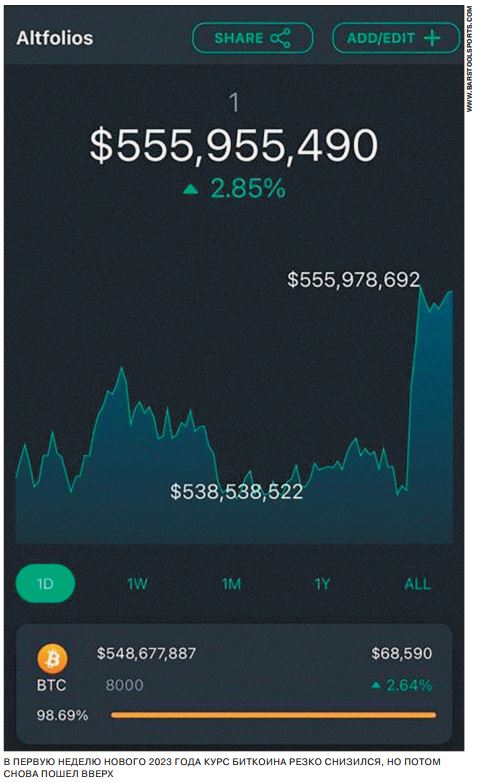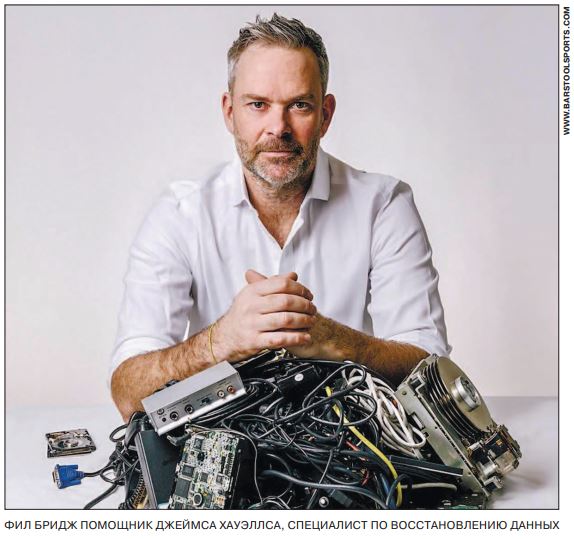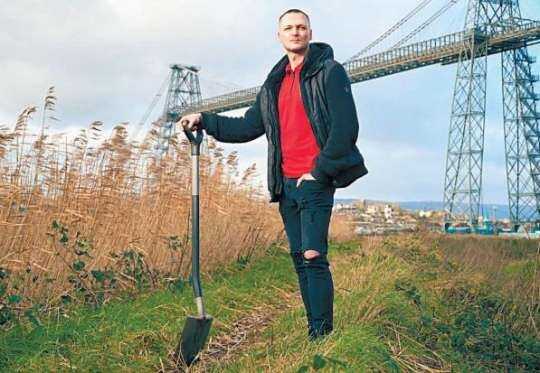Billions of dollars worth of bitcoins in the trash
For a man who lost $40 million in just one week of January 2023 (then the Bitcoin exchange rate showed the maximum decline. – Ed.), the Englishman James Howells looks, surprisingly, a serene and cheerful person. “I don’t care about that! – with a smile he answers the question about financial losses. – Once I “cost” half a billion, and now – only 170 million. If I thought about it a lot, I would have gone crazy a long time ago.
37-year-old James Howells is known for accidentally throwing away a computer hard drive in the summer of 2013, which contained a crypto wallet with 8,000 bitcoins. Moreover, bitcoins are the very first and cheapest. At the peak of the value of the main crypto coin, in November 2021, when each bitcoin was worth more than $69,000, it had $556 million. Howells was only mildly annoyed by last year’s cryptocurrency crash. He is confident in the revival of bitcoin and therefore advises buying it. Selling should be at a maximum in the second quarter of 2025, when the cue ball will cost, according to his calculations, about 175 thousand dollars per coin. If his predictions come true, he will rise one more rung of the hierarchical ladder of the rich and become a billionaire. His wallet will be worth approximately $1.4 billion in two years. True, all this will happen under one condition – if he breaks into the Newport landfill, where there is a glass disc in a metal case 7×10 centimeters; will find it among tens of thousands of tons of garbage and restore the data. He understands that the task is not easy, and compares it to looking for a needle in a haystack, moreover, blindfolded and wearing boxing gloves. And yet Howells is confident of success.
CHIEF MINER WALES
James Howells knows everything about computers, well, almost everything, because he has been collecting them since he was 13 years old. He has a craving for high technology from his mother, who many years ago, one might say, stood at the origins of microchips. His father, a carpenter by profession, gave him a penchant for pragmatism and practicality. They help him now to endure the blows of fate and believe in the ultimate success of a hopeless, in the opinion of many, enterprise.
In December 2008, when the creation of Bitcoin became known, James uploaded its 9-page description, but read it only in January. Having understood all the intricacies of “extraction” (mining), Howells began to mine bitcoins, i.e. decipher their algorithm and connect blocks with information about the transactions carried out into a continuous chain – blockchain and receive bitcoins for this.
James Howells remembers very well the day he started mining bitcoins – February 15, 2009. He is definitely one of the top five miners. It is possible that one of the other four was the legendary and semi-mythical creator of bitcoin – Satoshi Nakamoto. James usually turned on the computer for mining before going to bed, and woke up in the morning with 400 to 800 new bitcoins. From 9 am to evening he was engaged in the usual computer affairs. Once Howells lay in bed for a long time and stopped mining in the middle of the day. On that day, his “mining” amounted to 1200 crypto coins.
James Howells has been mining for two months. He calculated that if he had “mined” bitcoins, for example, before the end of 2009, he would have mined not 8 thousand, but half a million cryptocoins.
For the next few years, James rarely mentioned bitcoins. He was reminded of them in October 2013 by an article about an Oslo resident who mined bitcoins when they cost another $10, and in 2013 bought a luxurious penthouse with them. A couple of years earlier, Howells had spilled lemonade on the computer on which he mined bitcoins; I removed the hard drive with the crypto wallet from it and put it in the desk drawer.
One day, James decided to fulfill the request of a friend and put things in order in the office. He put old cables, keyboards, and other unnecessary parts and components of the computer into a black bag to throw them in the trash. Among them was a small hard drive that had so little memory that it was pointless to store it. Howells asked his girlfriend to throw out the garbage, but got the answer: throw it out yourself! He decided to do it in the morning, and before going to bed, he mentally told himself in the morning to make sure that he threw out the unnecessary disk. However, when he woke up, he found out that he could not do this, because the package with unnecessary details was no longer at home. A friend changed her anger to mercy and threw out the garbage when she took the children to school.
SMELLS
As you might guess, James Howells put the wrong disc in the bag. Over the next few months, he developed a plan to find him. The law allows searches in metal dumps, but only with the permission of the environmental department and the city council. However, James was in for an unpleasant surprise – the Newport City Council strongly opposed his plans to stir up the city dump.
“Mr. Howells has nothing to offer us,” one council member told reporters. We can’t take risks. His proposal poses a serious risk to the environment.” “We do not want to harm the environment in any way,” Mr. Howells retorted. “On the contrary, we want to leave everything behind in a better condition than before the search.”
It seems that the member of the council was also wrong about the fact that Howells had nothing to offer the city: for 9 years he made many profitable offers, but each time he was refused. Moreover, in absentia, because for all this time the members of the council never even met with him.
For permission to search, James Howells promised to allocate a substantial amount for educational and charitable projects, developed a program to turn Newport into a world center for cryptocurrencies, and was ready to give each of Newport’s 160 thousand people, including the elderly and infants, 50 pounds sterling (60 dollars). He promised the environmental department to finance the construction of a hydroelectric power plant for Newport and even offered to buy the landfill at a very high price, but it was all in vain. The “heavy artillery” did not help either. Hoping to break the city council’s stubbornness, he turned to Richard Hammond, the former host of the hit TV show Top Gear, for help. Hammond made a 12-minute documentary about James and uploaded it to YouTube last July. Alas, it didn’t help.
At first, Howells explained the stubbornness of the council members by the fact that next to the site where the search is supposed to be, there is an asbestos dump. He designed a protective barrier and promised to pay for its construction, but this did not affect the “fathers” of Newport. Now he has a different explanation. The Council is afraid to draw attention to the city’s landfill because it has serious violations. That reason, James pointedly says, “really smells really bad.”
HEAD ON THE WALL
In preparation for the search for the hard drive, the organizational skills of James Howells were revealed. He put together a team of experienced searchers who, with the help of artificial intelligence, identified a 200 by 250-meter area, on which, with almost one hundred percent probability, his precious disk lies in the mountains of garbage. James plans to sort the garbage at a special site next to the landfill. The search will be handled by the robot sorter Max-AI. Programmers will program it with an algorithm for finding items similar to a hard drive. The mechanical arm will remove from the conveyor and put aside all objects similar to it. Max will be assisted by two robotic Spot dogs. During the day, they will search for the disk, and at night they will patrol the landfill so that competitors do not break into it.

If successful, Howells plans to split the booty into three parts. The first part is the cost of the search itself, which the specialists from his team estimated at least 10 million pounds, and assistance to his native city; the second is to compensate the investors who finance the search operation, and he is going to keep the rest. The specialists he gathered estimate the probability of finding the disk at 80-100%. Of course, finding a disk is not enough. It is necessary to restore the necessary information, a unique code consisting of 51 numbers and letters. The city council, with whom James compares communication with banging his head against the wall, is sure that this is impossible, but experts believe that there are chances and that they are not so bad. Firstly, it is not necessary to restore the entire disk, but only a tiny area with the code; and secondly, he was in a plastic bag, which, in theory, should serve as protection and increase the chances of success.
One of James’ assistants, Phil Bridge, started DataRecoveryCompared.com and has been involved in data recovery for over a quarter of a century. His qualifications are so high that NASA invited him to recover data from the black box of the Columbia shuttle that crashed, by the way, exactly 20 years ago. The box was found only six months after the disaster at the bottom of a dry lake. Nevertheless, Bridge and other specialists managed to recover 99% of the information.

Bridge was interested in finding the hard drive because of its unusualness.
“It’s one of the stories that gets everyone interested,” he explains. If we are lucky, it will be fantastic luck. I really want to prove to everyone that they were wrong.
So far, all efforts by James Howells to break into the landfill are ending in failure. As a final argument, he reserved the trial. James can use the Theft Act of 1968.
“They basically stole my property,” he shrugs. “Newport City Council hasn’t returned the property stolen from me for nine years. They keep stolen goods. If they are not able to return my property to me, then let them at least compensate for its value.
0:8
Chainalysis estimates that approximately one in five bitcoins or 3.7 million crypto coins as of 2017 were in a “hibernation state”, i.e. no transactions were made with them for at least five years. Mostly because the owners threw away the hard drive, like James Howells, or forgot the password, like San Francisco programmer Stefan Thomas. Forgetfulness cost him 7002 bitcoins. They paid him off in 2011 for an animated video explaining how digital currencies work. That year turned out to be very volatile for bitcoin, its value swayed like on a swing. 11 years ago, Stephen’s fee, and, at the maximum ($ 32 per coin), amounted to 224 thousand dollars.
Thomas stored the password for his digital bitcoin wallet on an IronKey hard drive. The company claims that its security system is so strong that even its own programmers cannot reveal forgotten passwords. He also wrote down the password on a piece of paper that he lost that same year. IronKey gives customers ten password attempts, which can be up to fifty characters long. If all 10 fail, the content of the digital wallet disappears.
Eight attempts to open the wallet were unsuccessful. After the New York Times wrote about Thomas, he received thousands of tips, including an offer to seek help from clairvoyants, and passwords supposedly decrypted with their help, but it was all in vain – none of the passwords was correct.
Theoretically, Stefan could still become a multimillionaire, because, judging by the lack of information, he still has two attempts left. However, from his statements it is known that he has already come to terms with the loss.
To Thomas’s colleague, unfortunately Irish drug dealer Clifton Collins, who lost 6,000 bitcoins, Griboedov’s immortal phrase: “Woe from Wit” is quite applicable. Realizing that clouds were gathering over him, he decided to hide the bitcoins and divided them equally into 12 digital wallets, and hid the sheet of paper with the password in a fishing tackle box in a rented house in the town of Galway.
After $2,000 worth of marijuana was found in Collins’ car and he went to jail, the owner of the house started cleaning and threw out the crate along with the rest of the junk. Garbage first ended up in a city dump, after which it was sent to China and burned there.









